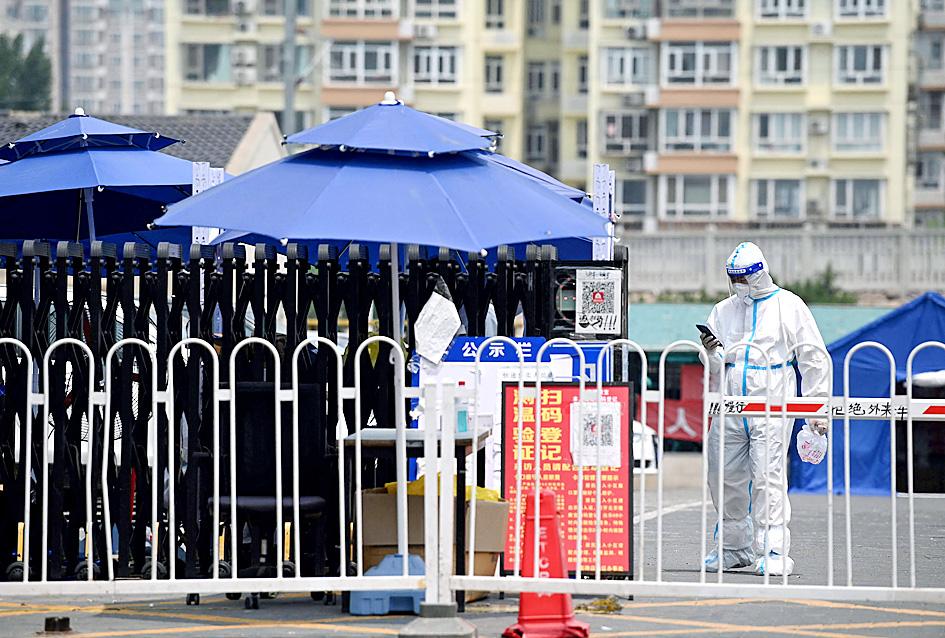Nearly a quarter of European companies in China are considering shifting their investments out of the country as COVID-19 outbreaks and lockdowns dim the outlook for the world’s second-largest economy, a survey showed.
About 23 percent of the businesses that responded to the survey are thinking of moving their current or planned investments away from China, a report released yesterday by the EU Chamber of Commerce in China said.
The survey was conducted at the end of April, when Shanghai was still in shut down and restrictions in places like Jilin Province disrupted business activity.

Photo: AFP
The number of European firms reassessing their options in China was the highest proportion in a decade, and also more than double the 11 percent recorded in a February poll, the chamber said, adding that 372 businesses responded to the April poll, whereas 620 responded to the February one.
China’s current policy — with no exit strategy for its zero tolerance approach to combating infections — “leaves headquarters no option but to look for other locations,” chamber vice president Bettina Schoen-Behanzin said. “The world does not wait for China.”
Of the firms considering a shift in investment, 16 percent said they were looking at relocating to Southeast Asia, while 18 percent said they were looking elsewhere in the Asia-Pacific region, 19 percent said Europe, 12 percent said North America and 11 percent said South Asia.
It is not clear when the property and the automotive sectors — two major drivers of the economy — would recover, Schoen-Behanzin said, adding that European businesses are re-evaluating their position in the market as they wait to see how long the uncertainty lasts.

Application-specific integrated circuit designer Faraday Technology Corp (智原) yesterday said that although revenue this quarter would decline 30 percent from last quarter, it retained its full-year forecast of revenue growth of 100 percent. The company attributed the quarterly drop to a slowdown in customers’ production of chips using Faraday’s advanced packaging technology. The company is still confident about its revenue growth this year, given its strong “design-win” — or the projects it won to help customers design their chips, Faraday president Steve Wang (王國雍) told an online earnings conference. “The design-win this year is better than we expected. We believe we will win

Intel Corp chief executive officer Lip-Bu Tan (陳立武) is expected to meet with Taiwanese suppliers next month in conjunction with the opening of the Computex Taipei trade show, supply chain sources said on Monday. The visit, the first for Tan to Taiwan since assuming his new post last month, would be aimed at enhancing Intel’s ties with suppliers in Taiwan as he attempts to help turn around the struggling US chipmaker, the sources said. Tan is to hold a banquet to celebrate Intel’s 40-year presence in Taiwan before Computex opens on May 20 and invite dozens of Taiwanese suppliers to exchange views

Chizuko Kimura has become the first female sushi chef in the world to win a Michelin star, fulfilling a promise she made to her dying husband to continue his legacy. The 54-year-old Japanese chef regained the Michelin star her late husband, Shunei Kimura, won three years ago for their Sushi Shunei restaurant in Paris. For Shunei Kimura, the star was a dream come true. However, the joy was short-lived. He died from cancer just three months later in June 2022. He was 65. The following year, the restaurant in the heart of Montmartre lost its star rating. Chizuko Kimura insisted that the new star is still down

While China’s leaders use their economic and political might to fight US President Donald Trump’s trade war “to the end,” its army of social media soldiers are embarking on a more humorous campaign online. Trump’s tariff blitz has seen Washington and Beijing impose eye-watering duties on imports from the other, fanning a standoff between the economic superpowers that has sparked global recession fears and sent markets into a tailspin. Trump says his policy is a response to years of being “ripped off” by other countries and aims to bring manufacturing to the US, forcing companies to employ US workers. However, China’s online warriors